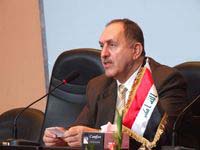Iraq to expel Washington Backed Mojahedin Khalq Despite American desperate support for terrorists
Larijani warns of plots to cause Iran-Iraq rift
Iran’s top lawmaker says efforts are underway to create a rift between Tehran and Baghdad, but stresses that all such efforts are in vain.

"Iran and Iraq have great potential for economic cooperation. That is why serious attempts are made to prevent them from establishing deep ties," Iranian Parliament Speaker Ali Larijani said during a Wednesday meeting with Iraqi lawmakers in Baghdad.
Larijani, who is in the Iraqi capital for a four-day visit, did not specify which parties oppose close ties between the two countries, but went on to criticize the United States for its ‘extremist’ behavior in the region.
He held Washington responsible for the rise in terrorist activities in Iraq and accused it of trying to spread ‘modern barbarism’ in the world.
Larijani also attacked Washington for encouraging the former Iraqi dictator, Saddam Hussein, to wage a devastating eight-year war against Iran in the 1980s.
Moving to the issue of the Mujahedeen Khalq Organization (MKO), Larijani asked the lawmakers to expedite the process of expelling members of the terror group from Iraqi soil.
After the meeting with Larijani, an Iraqi lawmaker described the Iranian parliament speaker’s comments about the MKO as very important and said that Baghdad was doing its best to expel the group, but added that no country was willing to accept them.
Second Deputy Speaker of the Iraqi parliament, Aref Tayfour, said MKO members must be transferred to a third country far from Iraq and Iran to be unable to infiltrate the borders of the two countries.
Late in July, Iraqi security forces stormed Camp Ashraf in Iraq’s Diyala province near the Iranian border and shut it down. Camp Ashraf had been housing some 3,500 members of the terrorist group for years.
The MKO, listed as a terrorist group in Iran, Iraq, Canada, and the US, has claimed responsibility for numerous deadly attacks against Iranian government officials and civilians over the past 30 years.
The attacks include the assassination of the late president Mohammad-Ali Rajaei, prime minister Mohammad-Javad Bahonar and judiciary chief Ayatollah Mohammad Beheshti.
The MKO is also known to have cooperated with former Iraqi dictator Saddam Hossein in suppressing the 1991 uprisings in southern Iraq and the massacre of Iraqi Kurds.
The organization is also notorious for using cult-like tactics against its own members and for torturing and murdering its defectors.

